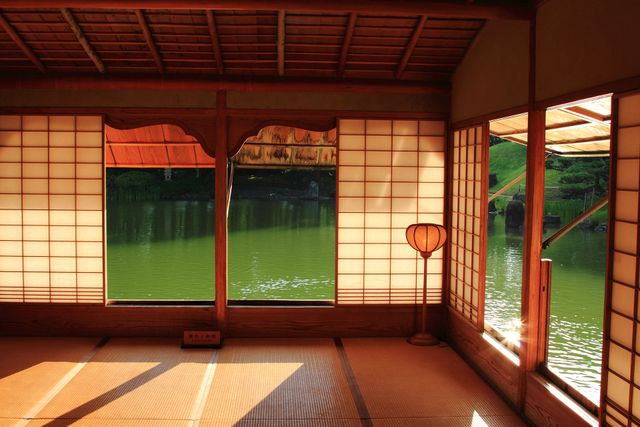Yohokan Garden
menuMenu
A serene and beautiful garden built as a villa for the Matsudaira clan, the feudal lords of Fukui, during the Edo period. Experience the elegant space created by the sukiya-style building floating on the pond and the scenery changing with the seasons.
















Highlights
- Garden built as a villa for the Matsudaira clan, the feudal lords of Fukui Domain during the Edo period
- Nationally designated Place of Scenic Beauty
- Strolling-style garden centered around a large pond
- Sukiya-style building seemingly floating on the pond
- Beautiful scenery throughout the four seasons
Basic Information
- Address
- 3-11-36 Hoei, Fukui City, Fukui Prefecture Search for tourist attractions in Fukui
- Access
- Approximately 15-minute walk from Fukui Station (JR West Japan, Hapiliner Fukui, Echizen Railway, Fukui Railway) via Fukui Prefectural Office (Fukui Castle ruins). Approximately 10-minute walk from Shin-Fukui Station (Echizen Railway). Approximately 10-minute walk from Jin'ai Joshi High School Station (Fukui Railway). Kyofuku Bus: Get off at "Kyo-do Rekishi Hakubutsukan-mae" (downhill) stop. Get off at "Kyoyo Center-mae" (uphill) stop. Get off at "Yohokan-guchi・Edo-jocho" stop. Get off at "Jyomachi" stop. Community Bus Sumairu: North Route (Tahara・Bunkyo direction) Get off at "Yohokan-guchi・Edo-jocho" stop. E8 Hokuriku Expressway: Approximately 6km from Fukui IC or Fukui Kita IC. There is no dedicated parking for Yohokan Garden; please use the parking lot of the Kyo-do Rekishi Hakubutsukan (Local History Museum). Show route
- Op.Hours
- 9:00 AM - 7:00 PM (November 6th to the end of February the following year: closes at 5:00 PM. Entrance closes 30 minutes before closing time.) Early Morning Free Admission: April 1st - October 31st, Reiwa 4 (2022) = 5:30 AM - 8:45 AM (From September 1st, opening time is 6:00 AM) *Free admission (From 9:00 AM, an entrance fee of 220 yen is required.) *Only the East Gate will be open. *Entry into buildings is not permitted. Only the garden is accessible for strolling.
- Cld.Days
- Only year-end and New Year's holidays (December 28th to January 4th of the following year)
- Fee
- General: 220 yen (Group: 160 yen) Combined ticket with Fukui City Museum of Local History: 350 yen (Group: 260 yen) A group discount applies to groups of 20 or more paid visitors. Free admission for those aged 70 or over, junior high school students and younger, and those with a disability certificate (please present your certificate), a developmental disability certificate, or a mental health certificate, and their caregivers. Free admission days: Family Day (the third Sunday of each month), Culture Day (November 3rd), and Hometown Day (February 7th). *The collection of admission fees for Yohkukan Garden is entrusted to Fukui Real Estate Management Co., Ltd. (Representative: Takashi Shimode, 1-5-4 Junka, Fukui City, Fukui Prefecture).
- INFO
- Please refrain from eating and smoking within the garden. Please refrain from bringing pets (excluding assistance dogs). Please be careful as some areas of the garden paths may be slippery or uneven. Please refrain from entering areas outside designated garden paths. Do not touch the fusuma (sliding doors), shoji (paper screens), walls, ranma (transom windows), shelves, etc., inside the buildings. Do not enter or exit buildings from the doen (earthen floor). (There is a dedicated building entrance with a shoe rack on the east side.) Do not descend from the tatami mats in the buildings to the doen. Do not sit on the projecting windows (deshoshoin) of the buildings.
